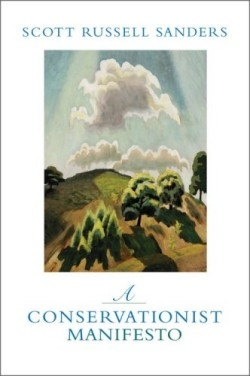A Conservationist Manifesto
Much like Thoreau John Muir Rachel Carson Mary Austin and Marjory Stoneman Douglas before him Scott Russell Sanders knows dearly the intimate ways in which humans are connected to the land. Like his forbears he marvels at the beauties of the rivers lakes woods and savors the sights and sounds of the wild creatures that make their homes in these wild places. Like his forbears Sanders also mourns the loss of wild places and understands that modern culture’s consumption and waste of natural resources is ruinous for the earth and all its creatures.
In this beautifully poetic set of meditations on conservation Sanders issues a clarion call for reversing society’s present path of ecological devastation and offers reflections on ways that individuals and society might provide better stewardship of the earth now and for future generations to come. Sanders asks “how might we shift to a more durable and responsible way of life? What models do we have for a culture of conservation? What changes in values and behavior would be required to bring it about?” As he travels from his home in southern Indiana where he teaches at Indiana University Bloomington to Mount St. Helen’s volcano and Minnesota’s Boundary Waters Wilderness he attempts to answer these questions and to map the practical ecological and ethical grounds for a conservation ethic.
With the advent of global warming the poisoning of our lakes and streams by acid rains and the looming shortages of fresh water Sanders urges society to think in creative ways about reversing such destruction and embracing means of conserving what resources that still remain.
At the center of Sanders’ book is his “conservationist manifesto” a document of forty declarations that aims to call culture to the excesses of rampant consumerism and waste and to call individuals to band together to act for the good of their home ground and the future of their planet. The first declaration acknowledges that “the work of conservation is inspired by wonder gratitude reason and love.” Sanders connects social justice with conservation in his manifesto: “A concern for justice also requires us to provide for everyone regardless of income or race the opportunity for contact with healthy land.” In his concluding declaration Sanders appropriately points to the need for humans to understand and embrace the interconnectedness of human life and natural life. “Conservation arises from the perennial human desire to dwell in harmony with our neighbors—those that creep and fly those that swim and soar those that sway on roots as well as those that walk about on two legs.”
Sanders’ eloquent book is a must-read for anyone committed to taking care of the natural world and passing it along to future generations.
Disclosure: This article is not an endorsement, but a review. The publisher of this book provided free copies of the book to have their book reviewed by a professional reviewer. No fee was paid by the publisher for this review. Foreword Reviews only recommends books that we love. Foreword Magazine, Inc. is disclosing this in accordance with the Federal Trade Commission’s 16 CFR, Part 255.

